Using technology to support outpatient addiction treatment
August 1, 2025
Revolutionizing Outpatient Recovery Through Technology

Transforming Addiction Care in the Digital Age
The integration of cutting-edge technology into outpatient addiction treatment has become a cornerstone of modern behavioral health strategies. As access barriers diminish, digital tools are expanding the reach, personalization, and effectiveness of recovery services. From telehealth and smartphone apps to virtual reality and AI, these innovations are redefining how patients engage with treatment, monitor their progress, and sustain long-term sobriety.
Best Practices for Integrating Technology into Outpatient Addiction Care
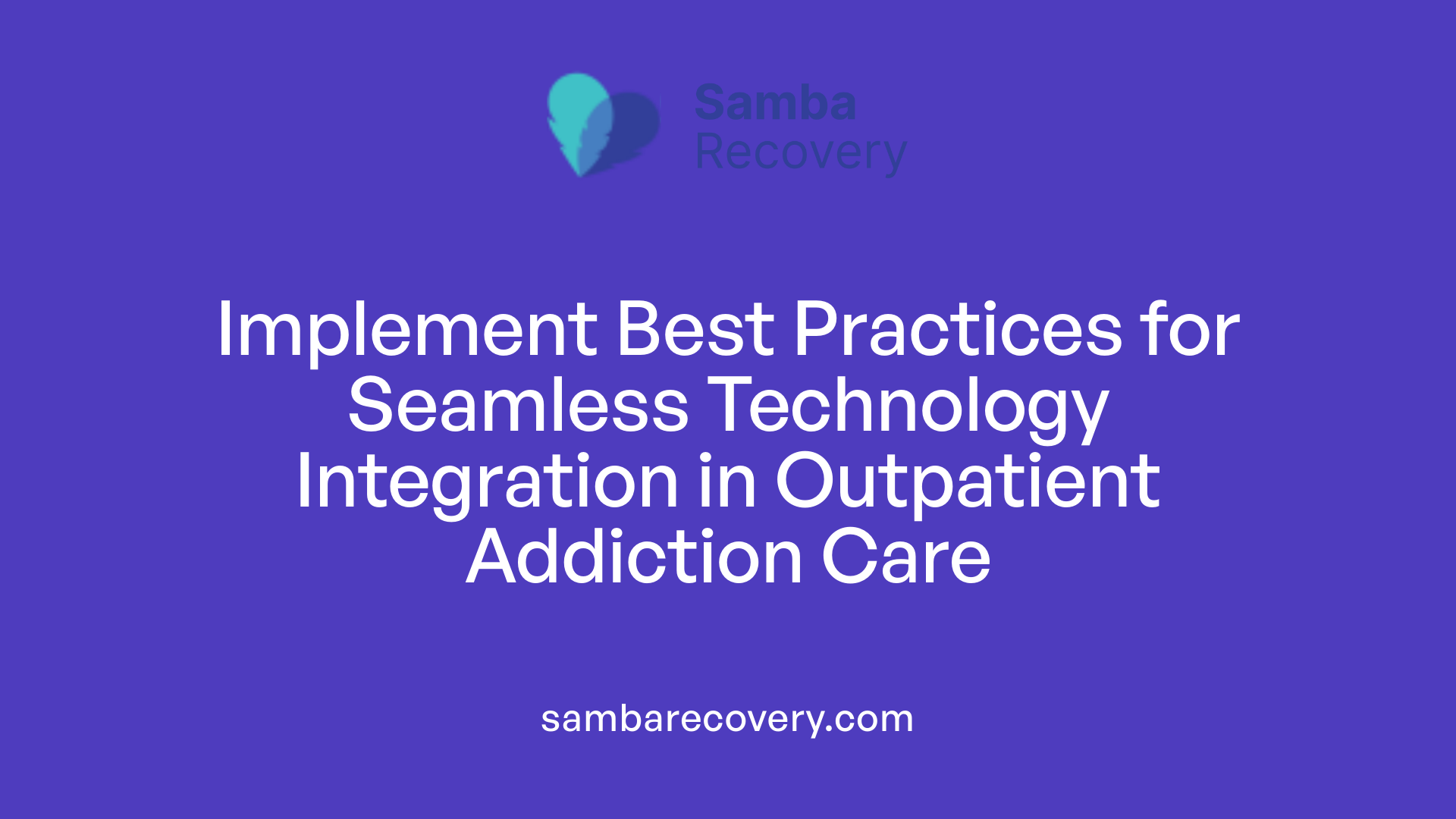
What are the best practices for integrating technology into outpatient addiction care?
Integrating technology into outpatient addiction treatment requires a strategic and evidence-based approach to maximize benefits while addressing potential challenges. The foundation involves incorporating digital tools that have demonstrated effectiveness, such as computerized assessments, web-based psychosocial interventions, and smartphone apps designed to support recovery.
Evidence-based digital tools, like the Therapeutic Education System (TES) and apps such as A-CHESS, are proven to enhance treatment outcomes through features like relapse prevention skills, real-time support, and personalized feedback. These tools must be user-friendly to ensure ease of use for a diverse patient population, which may include varying levels of technological literacy.
Patient confidentiality and data security are critical. Implementing strict security protocols—like data encryption, secure login/authentication, and transparent privacy policies—helps foster trust and compliance with legal standards such as HIPAA.
Real-time data collection through mobile apps and remote monitoring devices, such as wearables that track physiological signals, enables clinicians to monitor patient progress continuously. This data-driven approach allows for timely interventions and personalized adjustments to treatment plans.
Combining telehealth services with traditional in-person care expands access, especially for those in rural or underserved areas. Video counseling, remote monitoring, and electronic communication facilitate ongoing support, reducing barriers related to geography, transportation, and stigma.
Training clinicians and patients on the effective use of digital tools is crucial. Providers need education on integrating these technologies into workflows, while patients benefit from guidance on device use and understanding data feedback.
Addressing privacy concerns, ethical questions, and reimbursement policies is vital for sustainable adoption. Clear guidelines and policies should be established to protect patient rights, manage conflicts of interest, and ensure services are financially viable.
Ongoing research and continuous evaluation are essential. Collecting data on outcomes, patient satisfaction, and engagement helps refine strategies, ensuring interventions are effective across different settings and populations.
By adhering to these best practices, outpatient addiction care can become more accessible, personalized, and effective, leveraging technological advancements to support long-term recovery success.
Support for Behavioral Health and Substance Use Disorders Through Digital Tools
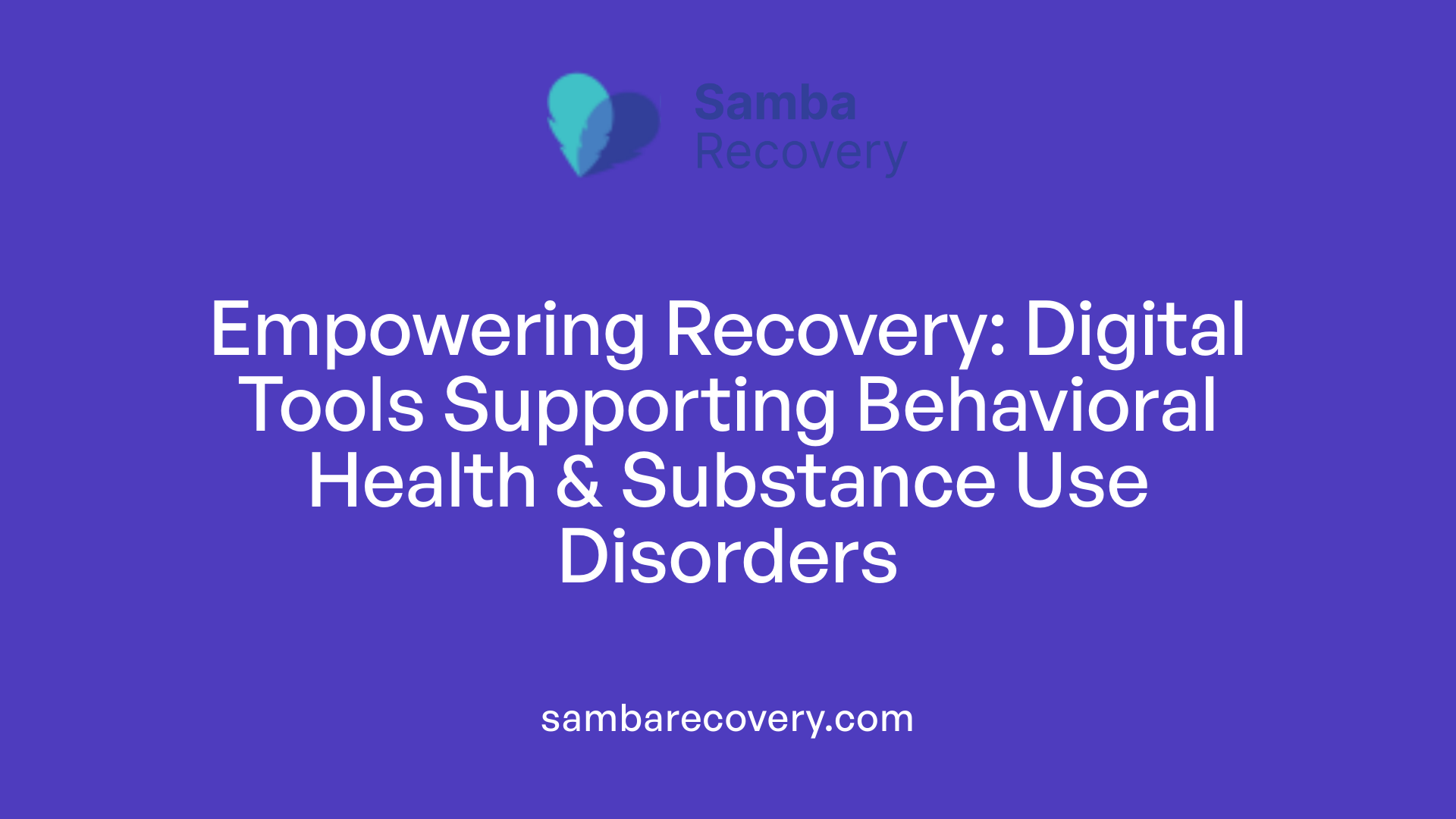
How do digital tools support behavioral health and substance use disorder recovery?
Modern technology plays a vital role in enhancing the accessibility and effectiveness of treatment for behavioral health and substance use disorders. Digital platforms such as websites, mobile applications, and telehealth services extend evidence-based interventions beyond traditional clinical environments. They enable individuals—especially those in rural, underserved, or stigmatized populations—to access care conveniently from their homes.
One of the significant contributions of digital tools lies in their ability to perform real-time assessment, monitoring, and delivery of personalized interventions. Wearable sensors, mobile devices, and multimedia modules can track vital signs and behavioral patterns, providing ongoing data that inform timely, tailored support. For example, wearable devices monitor physiological indicators like heart rate and oxygen saturation, flagging early signs of relapse or overdose, which clinicians can address promptly.
Advances in machine learning and AI enhance this capacity by analyzing collected data to predict risks and adapt interventions accordingly. Multimedia modules, including video scenarios and interactive exercises, teach coping skills and refusal strategies, increasing engagement and skill retention.
Recovery support extends through various digital tools such as mobile apps, online communities, virtual meetings, and peer networks. Applications like A-CHESS and Reset provide ongoing support, track progress, and reinforce motivation. Online communities like In The Rooms and social media groups offer peer support, reducing loneliness and fostering accountability. Virtual meetings, akin to in-person support groups, ensure anonymity and accessibility, especially critical during circumstances such as a pandemic.
Systems like the Therapeutic Education System (TES) and Addiction–Comprehensive Health Enhancement Support System (A-CHESS) have demonstrated improved outcomes, including higher abstinence rates and fewer heavy drinking days. These platforms utilize multimedia education, real-world scenarios, and continuous remote support to enhance traditional therapies.
Despite the promising results, challenges remain. Ongoing research aims to optimize the integration of these digital tools into standard care, ensuring that they effectively promote behavior change while safeguarding user privacy. Understanding the underlying mechanisms by which digital interventions influence recovery is also a critical area of investigation.
What questions are relevant regarding digital health tools?
- How can digital tools be further personalized to meet individual needs?
- What are the most effective features of online communities and virtual support networks?
- How do we address privacy and security concerns associated with digital health data?
- What mechanisms underpin the success of digital behavioral interventions?
- How can technology be adapted to ensure equitable access across diverse populations?
| Aspect | Description | Supporting Examples |
|---|---|---|
| Access Expansion | Nearly all treatment centers incorporate digital tools, making recovery resources more widely available | 85% of centers use tech, 67% of patients utilize recovery apps |
| Real-time Monitoring | Devices and AI tailor interventions based on ongoing data | Wearables like Spire monitor stress and physiological signs |
| Support Platforms | Online groups and virtual meetings foster community | In The Rooms, Sober Grid apps |
| Proven Systems | Demonstrated improvements in abstinence and heavy drinking reduction | TES, A-CHESS systems show positive outcomes |
| Challenges | Privacy, engagement, and integration hurdles persist | Need for further research to refine delivery mechanisms |
Efforts continue to refine these digital strategies, ensuring they are effective, secure, and accessible, ultimately supporting the goal of sustained recovery for individuals facing behavioral health and substance use disorders.
Enhancing Outpatient Addiction Treatment with Digital Technology
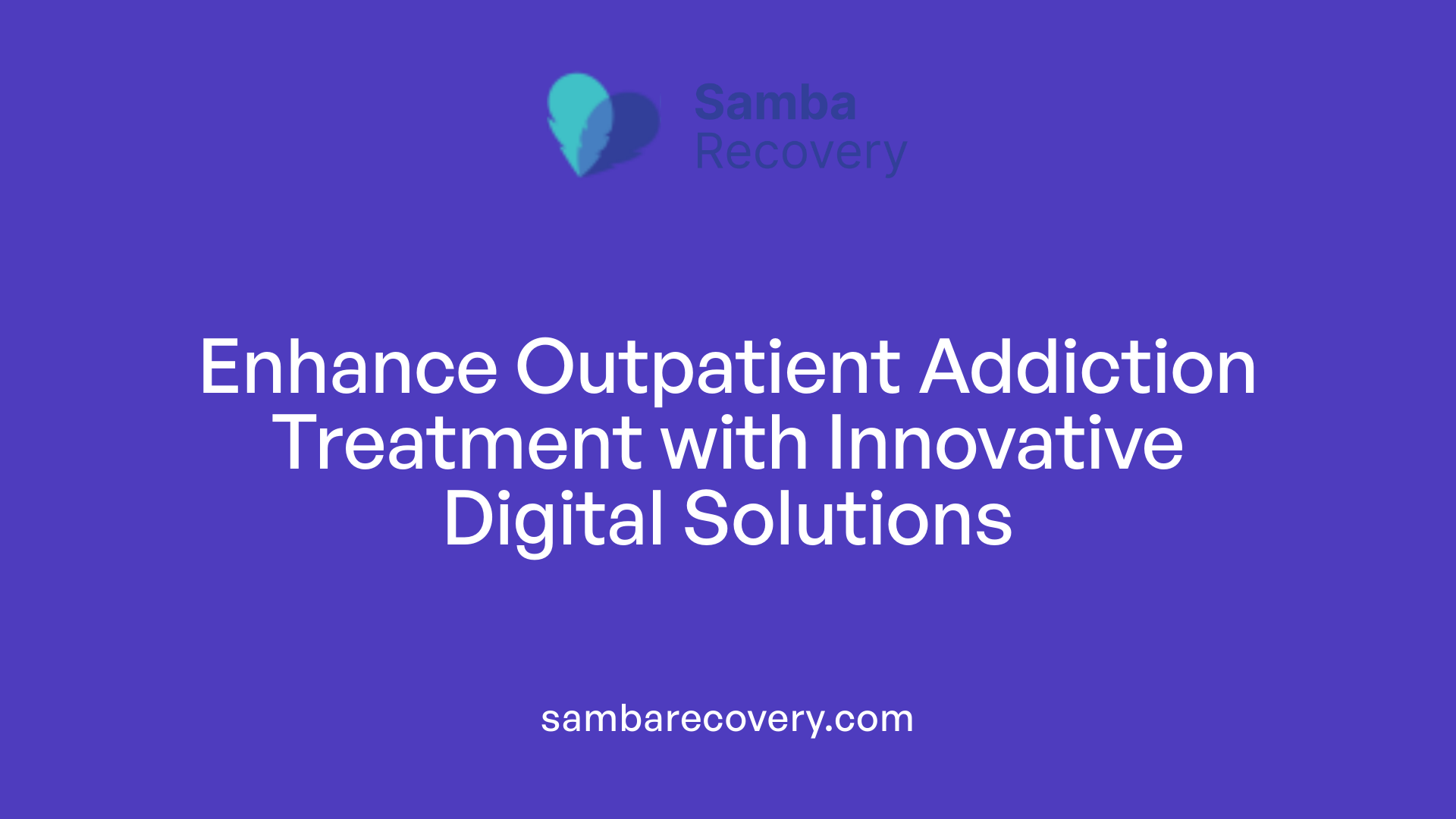
How can technology improve outpatient addiction treatment services?
Technology has transformed outpatient addiction treatment by broadening access, personalizing care, and supporting sustained recovery efforts. Telehealth platforms enable patients to attend therapy sessions remotely, overcoming geographical barriers and reducing stigma associated with in-person treatment. Virtual reality (VR) environments simulate real-world triggers, allowing patients to develop coping strategies in a safe, controlled setting.
Mobile apps such as A-CHESS and RESET offer continuous support through reminders, educational content, and progress tracking. These tools foster ongoing engagement, build community, and facilitate skill development outside clinical settings. Online communities and social media platforms create peer support networks that promote accountability and shared experience, which are essential components of recovery.
Wearable devices, equipped with biosensors, monitor vital signs like heart rate and sleep patterns. This real-time physiological data helps clinicians identify early signs of relapse or crisis, enabling timely interventions. Digital assessments and multimedia modules built on community reinforcement models enhance the accuracy and accessibility of treatment, especially for individuals in rural or underserved areas.
AI and machine learning algorithms analyze collected data to predict relapse risks and personalize treatment plans. This predictive modeling allows for proactive adjustments to therapy, increasing the likelihood of long-term success. Virtual therapy services, available through telehealth, offer convenient, confidential access to licensed professionals without the need for physical visits.
Overall, integrating digital tools into outpatient treatment programs makes care more adaptable, engaging, and effective. These innovations support continuous recovery efforts, empower patients, and can significantly improve long-term outcomes in managing substance use disorders.
Emerging Technologies and Innovations in Outpatient Addiction Care
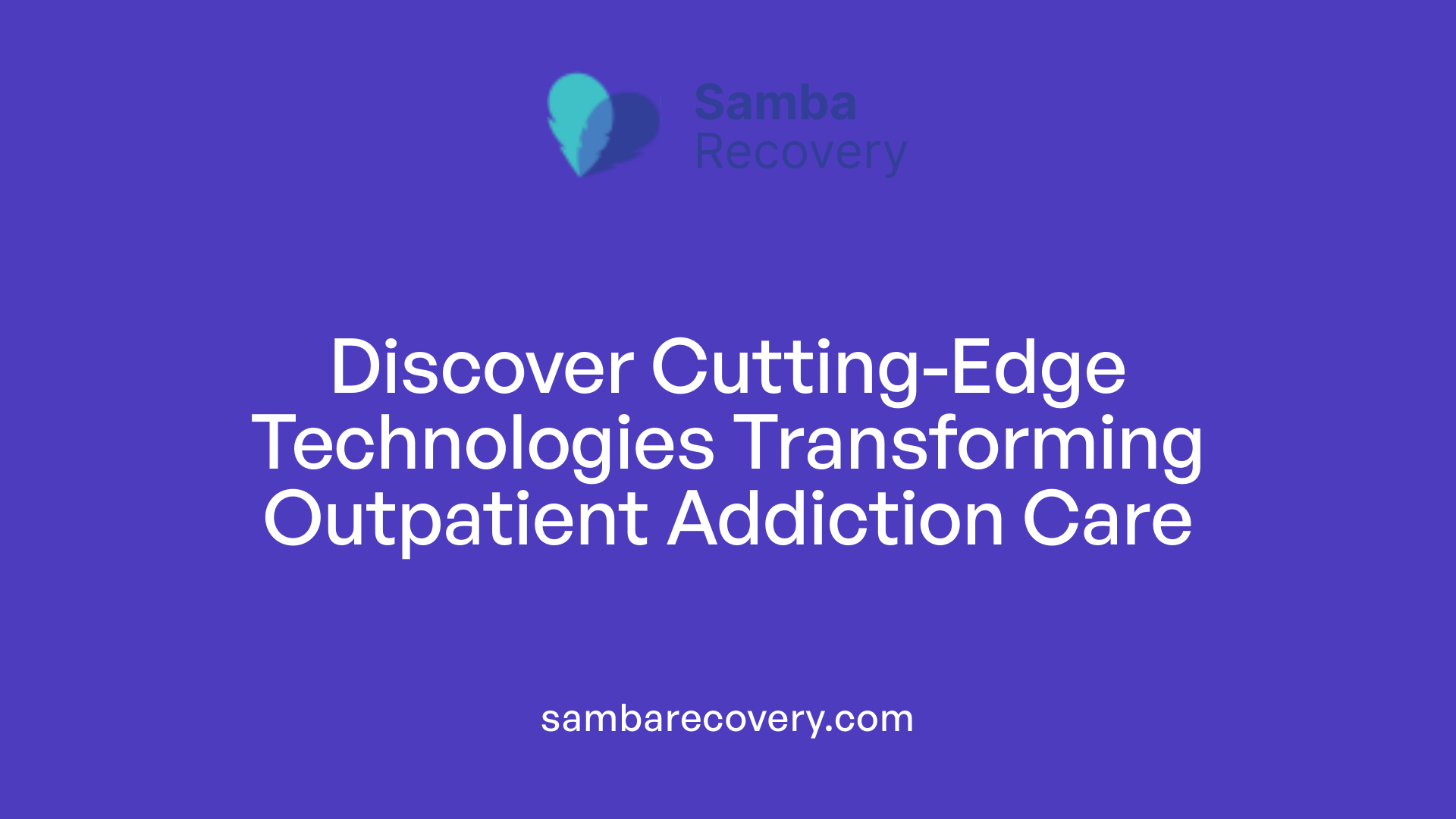
What are some emerging technologies and innovations in outpatient addiction treatment?
Recent advances are transforming how outpatient addiction care is delivered. Technology now plays a pivotal role in increasing accessibility, personalization, and effectiveness of treatment options.
One prominent evolution is the integration of telehealth platforms. These enable patients to attend therapy sessions remotely via video, phone, or messaging, reducing barriers related to distance, mobility, and stigma. Studies confirm that telemedicine can lead to significant reductions in substance use and improved mental health outcomes.
Mobile applications have become essential tools in the recovery process. Apps like 'I Am Sober', 'WEconnect', and 'Sober Grid' help users track sobriety, provide reminders, and connect with virtual support communities 24/7. FDA-approved apps, such as 'RESET', guide users through structured recovery stages, including mindfulness techniques and goal setting.
Virtual reality (VR) therapies offer immersive environments where individuals can confront real-world triggers safely and develop coping skills. Research has demonstrated VR’s ability to reduce cravings and anxiety, making it a promising adjunct to traditional therapy.
On the forefront of personalization are AI-driven tools and virtual agents. These analyze patient data to create tailored treatment plans, predict relapse risks, and deliver real-time motivational support through chatbots. For example, AI models utilizing machine learning can identify patterns suggestive of imminent relapse, enabling timely intervention.
Advances in neuromodulation techniques, such as Transcranial Magnetic Stimulation (TMS) and focused ultrasound, are investigated for their potential to reduce cravings and treat withdrawal symptoms. These non-invasive procedures modulate brain activity to promote recovery.
Digital interventions extend beyond individual therapy tools. Integrated health records and coordination platforms, like Welkin, facilitate communication among caregivers, ensuring cohesive care. Smartphone-based sobriety trackers, online mutual help groups, and digital assessment tools allow continuous, real-time monitoring and support outside clinical settings.
Complementing these technological tools are holistic approaches embedded within digital platforms. Mindfulness, yoga, and acupuncture are linked with apps and online programs, promoting mental resilience and emotional well-being.
Additionally, harm reduction tools such as naloxone patches and experimental fentanyl vaccines are increasingly linked to digital health initiatives for overdose prevention and long-term recovery.
Together, these innovations contribute to a comprehensive outpatient addiction treatment landscape that emphasizes personalized, accessible, and holistic care. The ongoing development of these technologies promises to further reduce barriers, improve adherence, and support sustained recovery.
| Technology Type | Examples | Benefits | Additional Notes |
|---|---|---|---|
| Telehealth | Video counseling platforms | Greater access | Overcomes geographic barriers |
| Mobile Apps | Reset, Sober Grid, I Am Sober | Progress tracking, support | FDA-approved apps aid structured recovery |
| Virtual Reality | Simulated trigger environments | Confrontation of triggers in controlled settings | Significantly reduces cravings |
| AI & Virtual Agents | Chatbots, predictive analytics | Personalized treatment, relapse prediction | Enhances engagement and timely response |
| Neuromodulation | TMS, focused ultrasound | Craving reduction, symptom management | Non-invasive, promising for treatment |
| Digital Support Platforms | Welkin, online communities | Care coordination, peer support | Strengthens outpatient treatment effectiveness |
| Holistic Approaches | Mindfulness apps, online yoga classes | Mental resilience, emotional stability | Often integrated with other digital tools |
| Harm Reduction | Naloxone patches, fentanyl vaccines | Overdose prevention | Innovations with increasing accessibility |
The continuous expansion of digital and technological innovations supports comprehensive outpatient care strategies. They not only enhance traditional therapies but also open new pathways for engagement, monitoring, and personalized intervention—crucial elements in managing and overcoming addiction.
Effectiveness of Digital Interventions in Outpatient Addiction Recovery
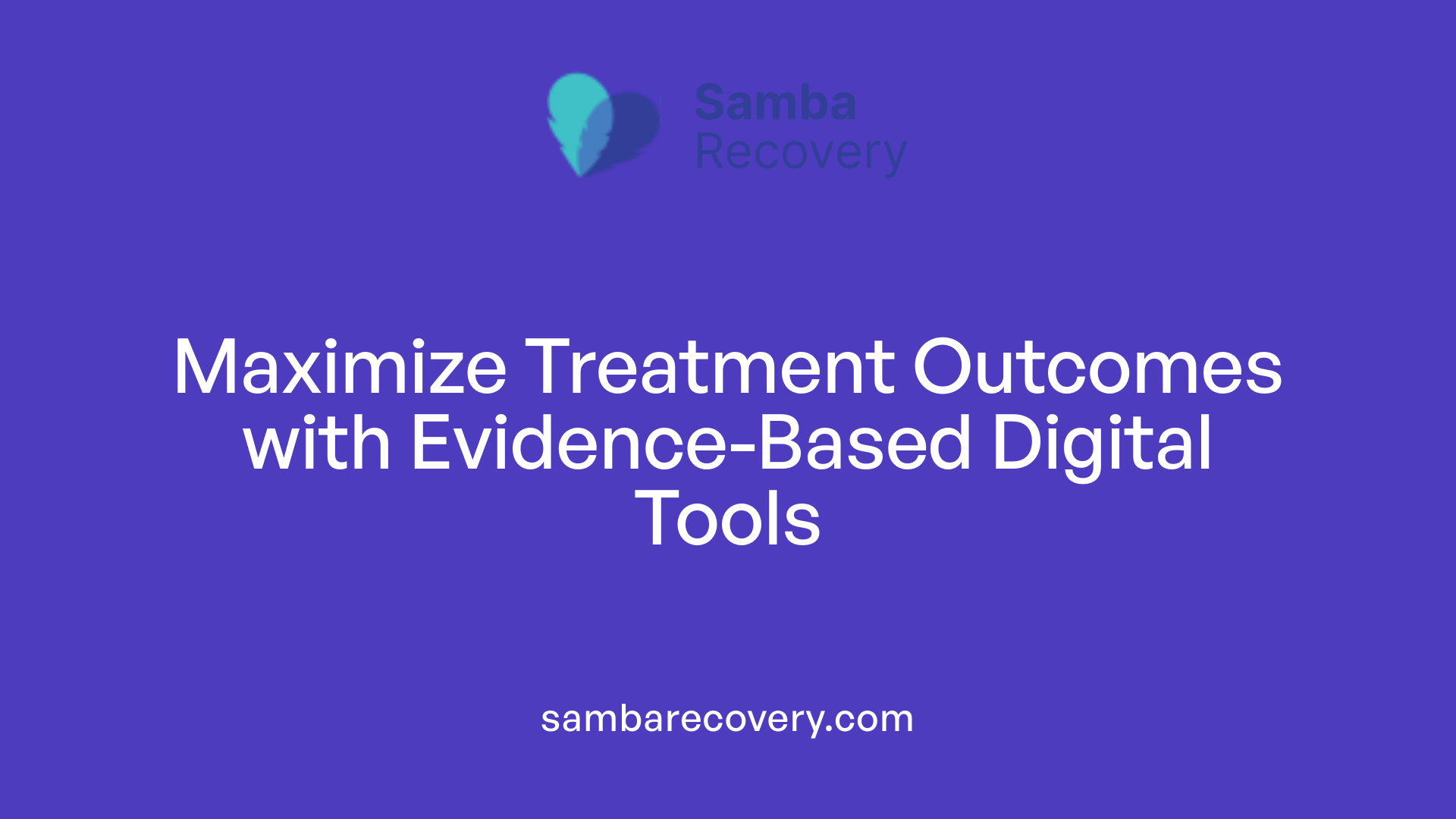
How effective are digital interventions in outpatient addiction treatment?
Digital tools have become increasingly prominent in supporting outpatient addiction recovery, offering flexible and accessible options for individuals who might otherwise face barriers to traditional treatment. Research indicates that various forms of digital interventions—such as smartphone applications, telehealth services, web-based programs, and text messaging—can significantly enhance engagement and adherence to treatment protocols.
Studies, including systematic reviews and randomized controlled trials, demonstrate that certain digital modalities lead to notable improvements in abstinence rates and help maintain treatment retention. For instance, app-based recovery tools like ACHESS have shown to reduce heavy drinking days, while online cognitive-behavioral therapy programs report higher rates of sustained sobriety compared to conventional methods.
Some examples where digital tools match or even surpass traditional therapy include virtual reality cue exposure therapy, which allows patients to confront triggers in controlled environments, and mobile apps that provide continuous support and accountability outside clinical settings. These innovations have proved particularly effective in managing alcohol and opioid use disorders.
However, the current body of evidence isn't without limitations. Variability exists across studies regarding methodology, sample sizes, and intervention design. Certain risks, such as relapse triggered by cue exposure therapy or potential privacy concerns, highlight the need for ongoing research. Additionally, many existing studies exhibit moderate to high bias, emphasizing the necessity for more rigorous trials.
Success factors influencing digital intervention outcomes include personalized content tailored to individual needs, ease of use, consistent engagement strategies, and integration with broader care systems. Participant characteristics like motivation level and technological literacy also play critical roles.
In summary, digital interventions hold promising potential as adjuncts or replacements in outpatient addiction treatment. They can improve access, foster long-term engagement, and support relapse prevention. Nonetheless, further comprehensive research is essential to refine these tools, validate their efficacy across diverse populations, and develop guidelines for their optimal implementation in clinical practice.
| Intervention Type | Evidence of Effectiveness | Notable Examples | Limitations & Considerations |
|---|---|---|---|
| Smartphone Apps | Increased abstinence, retention | Sober Grid, A-CHESS | Bias in studies, varying quality |
| Telehealth Services | Comparable to in-person therapy | Video counseling platforms | Technical barriers, privacy concerns |
| Web-based Programs | Support relapse prevention | Therapeutic Education System | Limited long-term data |
| Virtual Reality | Reduced cravings, anxiety | VR cue exposure studies | Cost, accessibility, need for tailored content |
| Wearable Devices | Early detection of relapse signs | Biosensors like PneumoWave ALERT | User acceptance, data accuracy |
This evolving landscape showcases the balance between technological potential and the need for rigorous assessment, paving the way for more effective, engaging, and personalized outpatient addiction support strategies.
The Future of Digital Support in Addiction Treatment
As technology continues to evolve, its integration into outpatient addiction treatment offers promising avenues for expanding access, improving personalization, and enhancing treatment outcomes. While current evidence underscores the potential benefits of digital tools such as telehealth, mobile applications, virtual reality, and AI-driven solutions, ongoing research, clinical refinement, and policy development are essential to realize their full potential. By combining innovation with evidence-based practices, digital technology can play a pivotal role in supporting sustainable recovery and delivering compassionate, accessible care to diverse populations across the globe.
References
- Technology To Improve Substance Abuse Treatment & Recovery
- LEVERAGING TECHNOLOGY TO ENHANCE ADDICTION ...
- The Role Technology Plays in Drug and Alcohol Recovery
- Treatment For Technology Addiction
- Using Technology in Addiction Treatment & Mental Health Care
- Addiction Recovery Tech to Help in Your Recovery Journey | Gateway
- Exploring the Impact of Technology on Addiction Recovery
About Samba Recovery
Start your treatment today!

Featured Articles
Read the latest addiction news and recovery tips from our blog.
Samba Recovery never miss an opportunity
Substance use may be part of your story, but it doesn’t have to be the rest of it. Sustainable recovery is possible and the best version of yourself is waiting at our Atlanta and Savannah, Georgia addiction recovery centers.
We’ll help you learn that the opposite of addiction is connection. We’ll give you skills to discover your self-worth and show you the tools for a life of hope and promise.
Contact us today!
We accept most major insurances
We partner with most major insurances, enabling you to access premier therapy services.










































































































